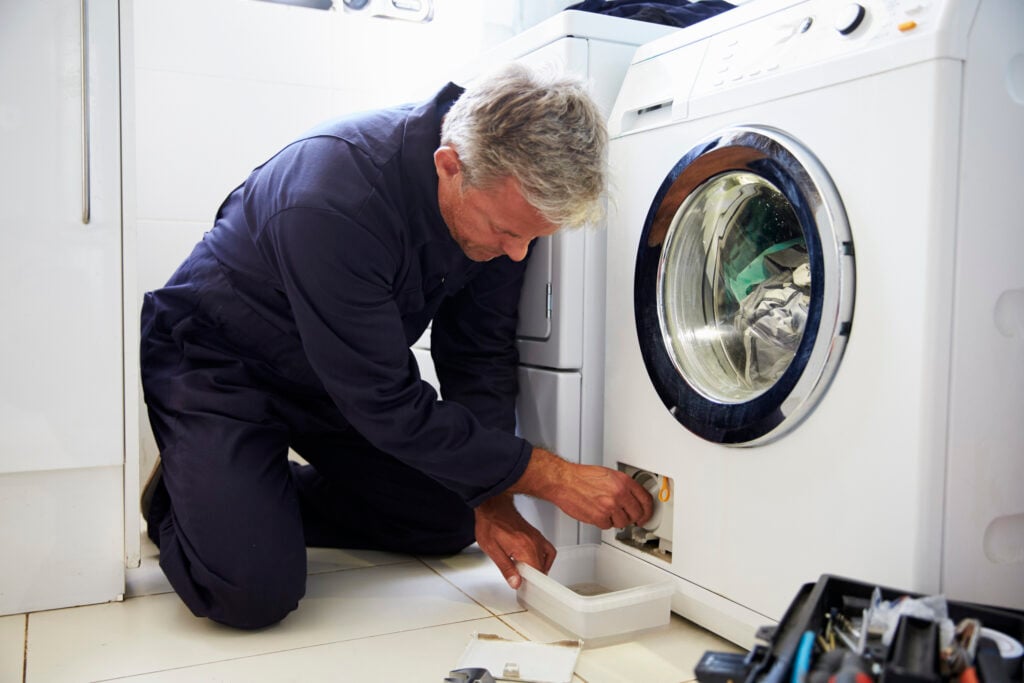
Backed-up drains anywhere are a hassle but backups in your laundry room are a real headache. To get up all the water on the floor, you have to move the machines. You can’t finish your laundry. And until you clear the clog in your drain, you can’t get your laundry done!
In this article, we’ll tell you how to detect future drain problems, what to do right away when a drain backup happens and how to prevent this problem from happening in the future. Remember this: Washing machine hose and drain problems are a major cause of water damage insurance claims! With a little attention to the way problems happen and how they can be prevented, hopefully, you will never have to file a claim like that.
In newer homes and of course, in condo and apartment buildings, washers may be on an upper floor. If an upstairs washer can’t drain properly, water may invade your lower floor or your downstairs neighbor in an apartment or condo building.
Warning Signs That Your Washer Drain Might Have a Problem
It’s smart to learn to recognize early warning signs of a drain that’s about to back up. If you see the following signs, take action right away and you might be able to prevent a laundry room flood:
- Slow draining: Keep an eye out for slow draining, as this could indicate a partial clog in the drain line. If your washer takes longer to complete than usual, or if you have water in the bottom of the washer when it shuts off at the end of a cycle, then you may have a problem developing with your washer drain.
- Unusual gurgling noises: Pay attention to the sounds water makes as it is pumped out of your washer. Unusual gurgling sounds may signal a developing blockage.
- Backups in other drains: Do you see water backing up in your kitchen sink, bathtub, or other drains while your washing machine is running? This calls for immediate investigation and action.
- Bad smells: Foul smells coming from your drains or laundry area can be a sign of debris or stagnant water in your pipes.
- Visible water: If there’s water pooling around the washer or making the walls around the washer damp, this is an obvious sign of trouble with your drain.
Undesirable Results from a Washer Drain Backing Up
Water on your laundry room floor is only one of the consequences of a backed-up water drain. The other consequences include water damage to floors, walls, furnishings and anything else that’s nearby. Also, a blocked drain puts extra strain on your washer’s pump which can cause it to wear out faster.
You particularly want to avoid persistent moisture from drain problems as these can lead to mold and mildew in that part of your house. That’s not good for anyone’s health.
What to Do Immediately When There’s a Washer Drain Backup
You will need to act quickly to minimize damage. Here’s what to do:
- Turn off your washing machine to stop the water from being pumped out onto the floor.
- For safety, unplug the washer.
- Use towels, a mop or a wet vacuum to remove the water on the floor.
That handles the immediate water emergency. Now, there are several things you can do to try to clear any blockages in the drain. Here are the next steps to take:
- Inspect your drain hose for any kinks and straighten it out if you find any.
- If there are any visible clogs, clear them out.
- Test your washer’s water pump by disconnecting the drain hose and placing it in a large bucket. Run a partial rinse cycle and see if the water pumps out smoothly.
Clearing a Clog from the Standpipe or Drain
If nothing shows up in these steps, then your next action would be to try to clear any clogs in the standpipe or drain. (The standpipe is the vertical pipe the drain hose empties into.)
If you have a plumber’s snake or auger, you can run this down the standpipe to clear out debris or clogs. Because not a lot of people have snakes, you can also try clearing clogs with a mix of household chemicals. Here’s how that works:
- Pour a cup of baking soda into the drain.
- Add a cup of white vinegar and then follow this with very hot water.
- Let the mixture set for 10 to 15 minutes.
There will be a lot of fizzing as these household chemicals interact. Minor clogs may be cleared by this chemical action.
When You Shouldn’t Try “Do It Yourself” Solutions for Clogged Drains
If other drains in your home are also backing up when your washer drains, the problem may be in your main sewer line. In this case, it’s best to call a professional plumber. You can try these home remedies but if they don’t work, your problem is not likely to respond to “do it yourself” measures. Call a licensed plumber and get the job done right.
However, even if you do call a professional, you should still learn how to avoid these problems in the future.
Effective Actions to Prevent Future Drain Backups
With a little simple maintenance, you can prevent these clogs from ever happening.
- Install a lint trap: Get a lint trap at a home improvement store and install it on your washer’s drain hose. This will catch some of the lint and other debris as it exits your washer and can prevent a buildup in your drain. Just remember to clean it out regularly.
- Clean your washer’s lint filter: Not all washers have lint filters but if yours does, empty it out regularly.
- No overloading: Loading too many clothes in the washer can result in excessive lint production which can then clog the drain.
- Don’t use too much detergent: Excessive quantities of detergent can create so many suds that residue forms in the standpipe or drain. Follow your manufacturer’s recommendations on the amount of detergent to use.
- Remove buildup with vinegar: Once a month, run an empty hot water cycle with vinegar or washing machine cleaner to help remove buildup.
- Test and clean drains periodically: Using the procedures above, you can test your hose and use baking soda, white vinegar and hot water to clear out debris, residue or minor clogs.
- Consider upgrading the drain pipes: Older homes often have narrow drain pipes that can’t keep up with the output of modern washers. If you have repeating drainage problems, you can consider installing wider pipes to deal with the higher volume of new washers.
- Be careful what goes down the drain: Try to avoid washing items with lots of hair on them. (Shake out items like dog beds and blankets first.) Also avoid washing items that could clog the drain such as coins, keys, tissues, paper or paper towels, old rags and clothes with oil or grease.
- Consider an annual inspection: Having a plumber inspect and clean out your washing machine drain can go a long way toward preventing future clogs.
Understanding the Causes of Washer Drain Backups
To prevent backups in your drains, it’s good to know how they are formed. Lint, soap scum and other debris from your washing loads can accumulate in your pipes, narrowing the width of the pipe and limiting the flow of water.
If your washing machine shares a drain line with other appliances or your kitchen sink, you can easily produce more water and waste than your plumbing can handle. You may have to install a larger drain to accommodate the flow of water. This is a common problem in older homes.
If you have a plumber in to inspect your system, you may also want them to ensure that your venting is adequate to allow water to flow out properly.
When to Call a Plumber to Service Your Drain
The do-it-yourself steps here are a good place to start and could resolve your clog. If you don’t get results with those actions, you’ll need a professional. If you notice that multiple drains in your house are acting up, it could be because you may have a clog in your main sewer line.
Professionals have the experience to figure out the cause of any of these problems and the tools to fix it. The problem in a sewer line could be debris from your washer but it could also be tree roots or cracked or collapsed pipes. Professionals can do remote camera inspections to find the problem.
One more piece of advice. While it might be tempting to use chemical drain cleaners, these can often do more harm than good, potentially damaging your pipes and harming the environment. Professional service can prevent this harm.
Contact Rocketman Plumbing in Albuquerque for Fast, Accurate Service
When you have a problem that you can’t clear up, call Rocketman Plumbing. We are available 24 hours a day, every day of the year. We know that many plumbing emergencies can’t wait. Call us at 505-243-1227 to get our experience on the job to eliminate your water drain problems at the first minute possible!
